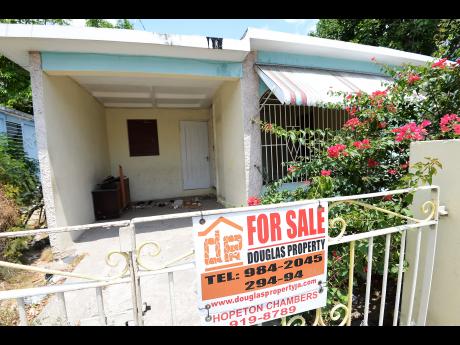Appraised value vs. sale price
Contributor Leslie B. Mae is back this week with his take on an issue of concern to many Jamaicans.
As the number of forced sales and foreclosures by lenders increases, there is much litigation pending and alleged negligent valuations of property that led to losses suffered by plaintiffs.
Issues arise as to whether a duty of care is owed, whether the standard of care was reached, and the quantification of damages.
Value is a perception based upon the combined factors of present and future anticipated enjoyment or profit. An appraised value is, therefore, nothing more than an expression of opinion of the appraiser as to the value of a property at a given date and under certain limiting conditions. Price is simply the amount of money paid for an item. Sale price of a piece of real estate is, obviously, the amount of money paid for the property.
Clearly, sale price is not the same as appraised value which is established by an appraiser, based on certain rules and conditions that influence his opinion.
Concern over the relationship between appraised value and price, among other concerns, led to the enactment of the Real Estate (Dealers and Developers) Act of 1987.
The Act requires that certified or licensed appraisers should carry out all appraisals relating to real estate transactions. At the same time the Real Estate Board was set up to regulate and control the practice of real estate business.
A critical function of the Board is to establish appraisal standards and qualification. The Act assures a certain minimum skill level, as all licensed or certified appraisers must meet the established criteria before they can be licensed or certified.
The expectation of most sellers is that the appraised value will approximate to the sale price of their property. This would be the case in a perfect market, where demand is matched by supply. In reality, appraised values are lower than sale prices in a rising market and higher in a declining market.
Appraised values are arrived at through what is referred to as the appraisal process. First, the appraiser ascertains the physical and legal description of the property to be appraised. This would include the street address and volume and folio number of the property.
Next, the property rights to be appraised are identified. The rights are normally the fee simple interest, but could be a lease or any other interest. The purpose of the appraisal is important as the method used to determine value is dependent on the purpose for which the appraisal is done.
For example, the appraisal might be for the purpose of ascertaining the replacement value of a building destroyed by fire or hurricane. The usual purpose for an appraisal, however, is to determine a value for lending and investment decisions.
The date of the appraisal is of vital importance as the characteristics of a property may change over time and any such change or changes in market conditions will affect the estimated value.
There are four well-established approaches to arriving at an estimated value of real estate and appraisers usually employ at least two of these approaches in their appraisals.
Next week, we will look at these approaches and the implications for the appraised value versus the sales price.
Keep sending your questions and comments and let's continue to explore A Matter Land. Until next time, traverse well.


